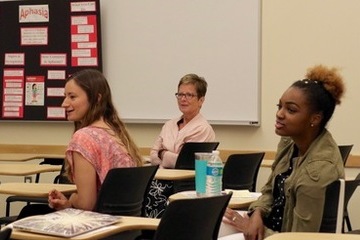Bulletin News

07/13/2018
More than 2 million Americans live with aphasia, a communication disorder that impairs the ability to process language.
Head trauma, stroke and dementia are some but not all causes of this type of brain injury. People with aphasia may have problems saying words the right way, thinking of the words to say or understanding conversations and written instructions. Approximately 80 percent of the population is unaware of the condition.
Graduate students in Eileen Gilroy’s Communication Disorders in Adults summer course are getting out into the Cortland community to help raise the quality of life for local people with aphasia as well as raising awareness.
A new partnership between the College and Cortland Regional Medical Center benefits SUNY Cortland students and medical professionals in the field.
Morgan Cerio ’17 and Margaret Woodworth ’17, both from Elmira, N.Y., are pursuing a master’s in communication sciences and disorders. As part of their coursework this semester, they developed visual menus to be used in a pilot program at Cortland Regional. These menus will allow patients who have trouble communicating verbally to point to photos of the meal they would like to receive.
“This is where they live, 24/7, so they should have the power to be able to choose for themselves what they want to eat,” Cerio said. “That is so hard for people with aphasia. Sometimes words get confusing for them. We’ve made it more accessible for the nurses to use, too.”

Patients with aphasia may be unable to understand questions or may use the wrong words when they try to speak. For example, when a patient is asked what they would like to drink with a meal, they may say “coffee” when they intended to say “water.” The visual menu will help medical professionals make sure that their patients are getting what they want.
“To get the wrong thing or to not be able to say, ‘I want salt and pepper on this,’ it’s so frustrating,” Woodworth said. “It gives them their quality of life back.”
On July 20, Marisa Spagnolo ’17 of Pepperell, Mass. and Angelique Jean-Charles ’16 of Elmont, N.Y. will deliver a presentation to Cortland Regional staff on how emergency responders can best interact with people with aphasia. Spagnolo and Jean-Charles will share the story of a person with aphasia who was driving when pulled over by a police officer. Symptoms of aphasia may make it appear as if they are intoxicated to those who are unfamiliar with the condition.
Paramedics and law enforcement officers who work patiently with those with aphasia can in turn better serve the medical professionals who will treat them. Students like Spagnolo and Jean-Charles are glad to share their expertise with others.
“It’s nice to show other professionals that we’re not just people who work in schools and work with kids on fixing their sounds,” Jean-Charles said. “We have a very profound background in neurology, not as much as neurologists, obviously, but we know the systems involved. It’s really interesting to see the medical aspect of it and how we can benefit others.”
First-hand experience working with medical professionals on aphasia issues is a vital learning tool for SUNY Cortland students.
"It takes a lot of patience on the part of the nurses and doctors to have those conversations," said Dana Hogan, a Cortland Regional speech-language pathologist, MS, CCC-SLP. "The students are learning how to communicate with them, which they can’t teach you in school. The practical knowledge of their background in communication sciences and disorders is put into the real world."
A number of students, including Lora Ottaviano ’17 of Smithtown, N.Y., Sarah Ellis ’17 of Whitney Point, N.Y. and Janelle Zachary ’17 of Cortland, N.Y., spoke with local residents at the Cortland County Area Agency on Aging’s annual senior enrichment day in June. Not only did they help raise awareness about aphasia, they also sought insight from local seniors on developing strategies for helping those living with the condition.
“It’s all about interprofessional collaboration,” Ottaviano said. “That’s something that’s heavily emphasized here in our program.”
Gilroy, a lecturer in the Communication Disorders and Sciences Department, has been working to inform the local community about aphasia since 2015. Cortland Mayor Brian Tobin ’94 has proclaimed June as National Aphasia Awareness Month. Gilroy’s students have also given presentations at Walden Place, an assisted living and memory care facility in Cortland, as well as Access to Independence of Cortland County.
The students are tasked with writing a reflection paper as part of the course, describing who they’ve interacted with and where they’ve visited. Gilroy said her students have been excited to add these hands-on experiences to their classroom instruction, as they feel like they’ve already made a difference.
“They feel like they’ve helped people who have communication problems who they don’t even know yet because they’re educating other people about it,” Gilroy said. “They’re spreading the word that might help people in our community who are having communication challenges.”

